Inside Matters
The gut health show – conversations with the most forward-thinking minds in health, fitness, science, nutrition and business. In-depth discussions about how our gut microbiome impacts our health, well-being, mood and more. Inside Matters was conceived by microbiome expert Dr James McIlroy as a platform to raise awareness of the importance of the gut microbiome. Our aim is to inspire and educate listeners around the world about the importance of gut health, equipping them with the knowledge they need to transform their lives for the better.
Episodes
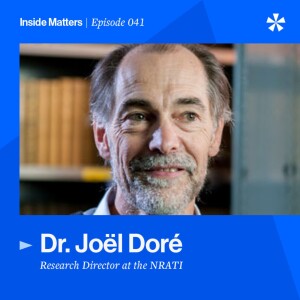
Thursday Feb 20, 2025
Thursday Feb 20, 2025
Exploring the Human Microbiome with Dr. Joël Doré: The Future of Gut Health Science
In this episode of Inside Matters, Dr James McIlroy engages in an enlightening conversation with Dr. Joël Doré, Research Director at the French National Research Institute for Agriculture, Food and Environment (NRAE). With over 40 years of experience in microbiome research, Dr. Doré shares his extensive knowledge on probiotics, gut health protocols, at-home microbiome testing, and the gut-brain axis. The discussion delves into the intricacies of the human microbiome symbiosis, the evolutionary development of gut microbiota, and its impact on health conditions such as obesity and chronic diseases. Dr. Doré also sheds light on innovative treatments like faecal microbiota transfer and the significance of microbial diversity for a healthy gut. Tune in to discover how the future of medicine and nutrition hinges on understanding and leveraging the microbial human.
Takeaways
The human body consists of roughly 50 trillion bacteria and 50 trillion human cells.
Gut microbiota aids in digestion and protects against harmful bacteria.
Microbiota educates the immune system, keeping it ready to react.
The microbiome develops from birth, influenced by diet and birth method.
C-section births can delay microbiota diversification and increase the risk of chronic conditions.
Diversity in the microbiome is crucial for health and chronic disease prevention.
At-home microbiome testing lacks standardization and medical utility.
Low microbiome richness is linked to higher chronic disease risks.
Microbiome diversity can predict responses to obesity treatments.
Acrimantium may play a role in health, but microbial ecosystem diversity is crucial.
Fecal microbiota transfer can significantly aid cancer treatment.
Probiotics may not establish long-term but can still be effective during gut transit.
The 100,000 Microbiome Project aims to explore gut health across all ages.
Gut permeability issues can lead to neuroinflammation and mental health challenges.
Future medicine will focus on the microbial aspects of human health.
Chronic conditions are increasingly linked to microbiome health.
Dietary choices profoundly impact gut microbiota diversity.
Research is ongoing to better understand the gut-brain connection.
Preventive nutrition should consider microbial health as a key factor.
Timestamps
00:00 Introduction to Dr. Joël Doré and Microbiome Research00:32 Exploring Probiotics and Gut Health Protocols00:49 At-Home Microbiome Testing: Strengths and Limitations01:38 Understanding the Human Microbiome Symbiosis02:48 The Role of Gut Microbiota in Health and Disease08:18 Microbiome Development from Birth11:08 Impact of Birth Methods and Early Life on Microbiome12:00 Antibiotics and Microbiome Diversity17:48 Challenges in Defining a Healthy Microbiome24:38 At-Home Microbiome Testing: Current State and Future Directions32:51 Microbiome and Obesity: Insights from Research34:21 Microbiome and Immunotherapy: Potential and Challenges39:02 Prognostic Model and Microbiota Transfer40:21 Mad Pharma: Pioneering Fecal Microbiota Transfer41:50 Autologous and Allogenic Microbiota Transfer43:53 Challenges and Innovations in Microbiota Transfer51:25 Probiotics: Do They Work?01:01:50 The Best Diet for the Microbiome01:03:00 The 100,000 Microbiome Project01:08:13 The Gut-Brain Connection01:12:58 Vision for the Future of Microbiome Research01:14:35 Conclusion and Final Thoughts
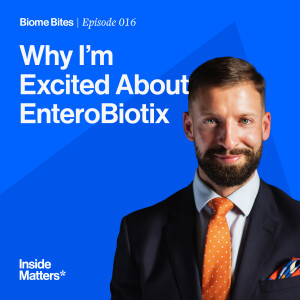
Thursday Jan 09, 2025
Thursday Jan 09, 2025
In this episode, James discusses the progress and future of EnteroBiotix, a company focused on gut health and microbiome therapeutics. He reflects on the transformative year of 2024, highlighting significant milestones in clinical trials, particularly in liver disease and irritable bowel syndrome (IBS). James emphasises the importance of clinical data in drug development and the company's commitment to improving patient care through innovative therapies. He also shares insights on the connection between gut health and overall well-being, and the company's plans for future growth and regulatory engagement.
Takeaways:
EnteroBiotix aims to improve gut health and microbiome therapeutics.
2024 was a transformative year with significant milestones.
Clinical trials are crucial for proving drug efficacy.
The connection between gut health and liver disease is significant.
Irritable Bowel Syndrome (IBS) is often misunderstood as a syndrome.
EnteroBiotix is focused on full-spectrum microbiome therapy.
Data from clinical trials is essential for stakeholder engagement.
The company is committed to patient care and innovative solutions.
Regulatory engagement is key for future drug development.
The team at Interbiotics is dedicated and capable, of achieving remarkable results.
Timestamps:
00:00 Welcome and Introduction
00:19 Overview of EnteroBiotix
01:13 Reflecting on 2024 Achievements
02:00 Clinical Trials and Milestones
04:16 Liver Cirrhosis Trial Insights
08:07 IBS Clinical Trial Success
11:52 Future Prospects and Goals
14:45 Conclusion and Gut Health Tips
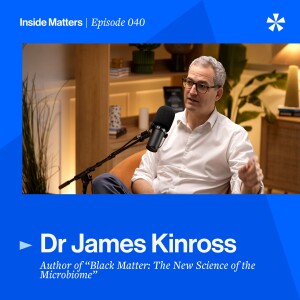
Thursday Nov 28, 2024
Thursday Nov 28, 2024
In a conversation with Dr. James Kinross, a senior lecturer and consultant surgeon at Imperial College London, various aspects of the human microbiome are explored. He is also the author of "Dark Matter: The New Science of the Microbiome".
Dr. Kinross discusses what constitutes a healthy microbiome and the challenges in analyzing it. The conversation also covers new research linking microbiomes to the effectiveness of cancer drugs, the concept of an 'internal climate crisis' within our guts, and the importance of the early life microbiome. Furthermore, Dr. Kinross shares practical advice on diet, probiotics, and the impact of social interactions on gut health.
The dialogue concludes with insights into microbiome testing and its crucial role in both clinical settings and personal health management.
Key Takeaways:
Microbiome Complexity: The microbiome is like a newly discovered organ, vital for health but complex to define and influence. Understanding it is crucial for advancing medical science.
Diet and Diversity: A diverse diet rich in plant fibres supports a flourishing microbiome, which can protect against chronic diseases.
Targeted Therapies: Probiotics and microbial therapies hold promise but require more precise application and understanding to be truly effective.
Prevention Focus: The most significant potential of microbiome science lies in disease prevention, particularly through early-life interventions.
Chapters
00:00 Introduction to Dr. James Kinross and His Work
00:27 Exploring the Microbiome: Definitions and Challenges
00:46 Microbiome and Cancer Research
00:54 Analogies and Concepts in Microbiome Science
01:56 The Dog Microbiome: Insights and Comparisons
07:17 Microbiome Bubble: Hype or Reality?
12:09 The Importance of Microbial Conservationism
20:52 Antibiotics and Microbiome Scarring
28:00 Co-Evolution of Microbes and Humans
37:33 Practical Advice for Improving Your Microbiome
41:07 Understanding Biodiversity and Microbiome Health
41:48 Defining a Healthy Microbiome
42:28 Challenges in Microbiome Diagnostics
46:03 The Role of Diet and Antibiotics
51:51 The Controversy of Probiotics
58:08 Microbiome Testing in Clinical Practice
01:06:31 Microbiome's Impact on Drug Efficacy
01:11:14 Future of Microbiome Therapeutics
01:15:04 Practical Advice and Final Thoughts
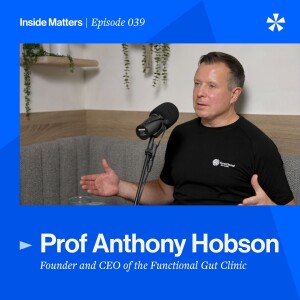
Thursday Nov 07, 2024
Thursday Nov 07, 2024
In this episode of Inside Matters, Dr. James McIlroy is joined by Professor Anthony Hobson, founder and CEO of the Functional Gut Clinic.
They discuss gut health diagnostics and treatments, focusing on the evolution of gut health understanding and therapies. Key topics include microbiome diagnostic testing, the importance of understanding gut functions, the impact of lifestyle on gut health, and the efficacy of various treatments for conditions like IBS and SIBO. The conversation also covers the development of non-invasive testing methods, the role of the second brain in gut health, and future directions for the Functional Gut Clinic and the field of digestive health.
Takeaways
Gut health is the interface between the body and the outside world.
Understanding gut functionality is crucial for effective treatment.
Education on gut health is lacking in traditional medical training.
IBS is often misdiagnosed as a lifelong condition when it can be treated.
The brain and gut communicate closely, affecting sensitivity and pain.
Breathing techniques and hypnotherapy can significantly aid gut health.
Placebo effects are powerful in treating gut-related issues.
Functional Gut Clinic has evolved to offer a range of services.
Tummy MOT aims to educate consumers on effective gut health products.
Diet and lifestyle are fundamental to maintaining good gut health. The leaky gut is not as common as is often believed.
There are actionable treatments for leaky gut, including glutamine.
Moderate alcohol consumption can be beneficial for gut health.
The proximal colon plays a crucial role in digestion and gut health.
Understanding gut function is key to effective treatment.
FMT has shown promising results in certain patient populations.
The microbiome's diversity is essential for gut health.
IBS may not be a lifelong condition and can be treated effectively.
Dietary changes should focus on moderation rather than restriction.
A comprehensive approach to gut health is necessary for long-term wellness.
00:00 Introduction to Professor Anthony Hobson and the Functional Gut Clinic
00:54 The Importance of Gut Health and Functional Testing
01:23 Building the Functional Gut Clinic and TummyMOT Initiative
02:03 Listener Engagement and Podcast Support
02:40 Defining Gut Health and Its Importance
04:05 Challenges in Gut Health Diagnosis and Treatment
09:32 The Brain-Gut Connection and Sensitisation Studies
13:06 The Role of Breathing Techniques and Hypnotherapy
17:57 Debunking Myths and Raising Standards in Gut Health
27:23 Fundamentals of Maintaining Good Gut Health
35:34 Understanding the Migrating Motor Complex
36:36 Spacing Out Meals for Gut Health
37:27 The Role of Coffee in Digestion
37:58 Exploring Leaky Gut Syndrome
44:18 Alcohol and Gut Health
48:41 The Fascinating Proximal Colon
01:04:29 Small Intestinal Bacterial Overgrowth (SIBO)
01:13:24 Future of Digestive Health and Functional Gut Clinic
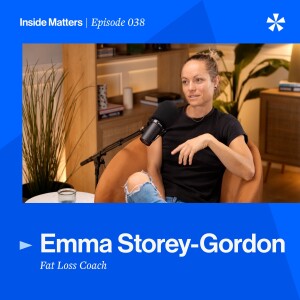
Thursday Oct 03, 2024
Thursday Oct 03, 2024
In this conversation, Dr James McIlroy and Emma Storey-Gordon discuss common myths and misconceptions surrounding health, fitness, and nutrition.
They explore the law of diminishing returns in exercise, the latest science in nutrition including fasting and protein consumption, and the importance of meal timing and insulin sensitivity.
Emma shares practical advice on setting nutrition targets, the gradual increase of fibre intake for gut health, and the role of supplements. They also touch on the individualized approach needed for training during menopause and the importance of community in building a successful health and fitness business.
Takeaways
Just do something, just move.The law of diminishing returns applies to exercise.Meal timing can impact insulin sensitivity.Setting realistic nutrition targets is crucial.Gradually increase fibre intake to avoid discomfort.Personalized nutrition is often marketed but not always practical.Exercise has profound effects on mental health.Community and environment play a key role in business success.You need to treat individuals as unique cases in health.Start slow but keep it engaging to avoid boredom.
Chapters
00:00 Introduction to Health Myths and Misconceptions03:01 The Law of Diminishing Returns in Exercise05:56 Nutrition Science: Fasting and Protein Consumption09:08 The Importance of Meal Timing and Insulin Sensitivity11:58 Practical Nutrition: Setting Targets for Protein and Veggies14:52 Gut Health: Building Up Fiber Intake Gradually17:52 The Role of Supplements and Personalized Nutrition20:59 The Impact of Exercise on Mental and Physical Health23:44 Menopause: Individualized Approaches to Training27:01 Building a Business in Health and Fitness29:53 The Importance of Community and Environment in Business32:47 Final Thoughts on Health, Nutrition, and Business
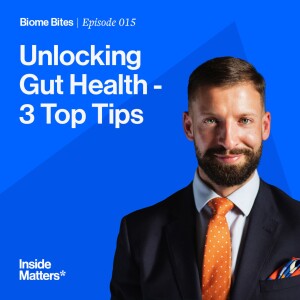
Thursday Sep 05, 2024
Thursday Sep 05, 2024
In the latest episode of Biome Bites, Dr James McIlroy returns after a hiatus to share valuable insights into gut health.
Learn about the significant role of polyphenol-rich foods such as dark chocolate, green tea, and berries, and how incorporating them can benefit your gut microbiome. The episode also delves into the importance of meal spacing for digestive health and introduces the diaphragmatic breathing technique, which can reduce stress and improve gut function. Tune in to discover practical tips to enhance your gut health and overall well-being.
00:00 Welcome Back to Inside Matters
00:18 Introduction to Gut Health
00:33 Tip 1: Incorporate Polyphenol Rich Foods
02:09 Key polyphenol-rich Foods
04:51 Tip 2: Space Out Your Meals
07:35 Tip 3: Engage in Belly Breathing
10:01 Conclusion and Recap
Welcome Back to Inside Matters: Boost Your Gut Health with These Three Essential Tips
Hello to all our Inside Matters listeners! After a brief hiatus, I'm excited to return and dive into one of our favorite topics: gut health. Today, I'm sharing three essential gut health tips, rooted in personal experience and backed by science, to help you enhance your overall wellness.
#### Tip 1: Incorporate Polyphenol-Rich Foods
Polyphenols have been a recurring topic on our podcast, and for good reason. As one of the three Ps—prebiotics, probiotics, and polyphenols—they play a critical role in promoting gut health. Polyphenols are powerful antioxidants found in many plant-based foods. They encourage the growth of beneficial gut bacteria while suppressing harmful varieties.
**The Science Behind Polyphenols**
Animal studies and human observational evidence demonstrate that polyphenols can significantly impact the microbiome. Notably, blue zones—regions of the world with high concentrations of centenarians—feature diets rich in polyphenols. When polyphenols reach the colon, gut bacteria metabolize them into bioactive compounds, fostering a symbiotic relationship that leads to numerous health benefits.
**Key Polyphenol-Rich Foods**
1. **Dark Chocolate**: High-cacao, low-sugar dark chocolate is not only delicious but also loaded with flavonoids, a type of polyphenol that supports gut bacteria diversity.2. **Green Tea**: Rich in catechins, green tea can positively influence gut bacteria and reduce inflammation. It's also associated with a broad array of health benefits.3. **Berries**: My personal favourites—blueberries, strawberries, and raspberries—are packed with anthocyanins that benefit gut health. These berries are true superfoods, rich in vitamins and minerals.
For optimal health, integrate these foods into your daily routine. For instance, enjoy a piece of dark chocolate post-exercise or start your day with a punnet of blueberries and raspberries.
4. **Olive Oil**: Rich in various polyphenols, including oleuropein, olive oil nourishes gut bacteria and protects against oxidative stress. Use it as your primary cooking fat and for salad dressings, ensuring you choose high-quality, extra virgin olive oil from reputable sources.
Tip 2: Consider Spacing Out Your Meals
Frequent eating and constant snacking can disrupt the migrating motor complex (MMC)—a recurring pattern that occurs in the stomach and small intestine during fasting periods. This "cleansing wave" moves undigested food and bacteria through the digestive tract, preventing the buildup of harmful substances.
**Why Spacing Meals Matters**
Allowing time between meals helps avoid issues like bloating, gas, and digestive discomfort. The classic advice is to wait three to four hours between meals. Personally, I have a large breakfast or brunch post-exercise, a healthy snack like a high-quality protein bar, and a substantial dinner. This eating pattern supports my nutritional needs and ensures I'm not feeling hungry before bed.
Tip 3: Engage in Belly Breathing
Diaphragmatic breathing, or belly breathing, is a simple yet powerful technique that stimulates the vagus nerve, connecting the gut to the brain. This type of breathing promotes deep relaxation and has significant benefits for gut health.
**How to Practice Belly Breathing**
1. Sit or lie in a comfortable position.2. Place one hand on your chest and one on your abdomen.3. Inhale slowly through your nose, allowing your abdomen to rise.4. Exhale slowly through your mouth, feeling your abdomen fall.
Aim to practice this for five to ten minutes daily. Belly breathing can reduce stress—a major trigger for gut issues like IBS—and improve symptoms such as bloating, constipation, and abdominal pain.
---
In summary, incorporating polyphenol-rich foods, spacing out your meals, and engaging in diaphragmatic breathing can profoundly benefit your gut health. I hope you've enjoyed this return episode of Inside Matters. Recording this podcast is intellectually stimulating, and the positive feedback from you, our listeners, makes it all worthwhile.
Remember, gut health is health. Feel free to reach out with suggestions for future content. Thank you for listening!
Stay healthy,James
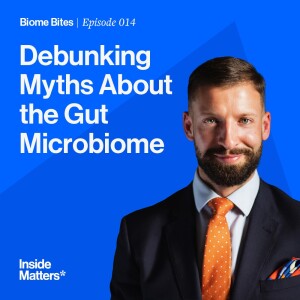
Thursday Aug 08, 2024
Thursday Aug 08, 2024
In this Biome Bite, Dr James McIlroy 3 myths and misconceptions about the gut microbiome.
Timecodes:
00:00:00 Intro
00:00:56 Weight of the microbiome
00:04:39 We’re more microbial than human
00:07:00 Microbiota is inherited from our mothers
What we're talking about today on this Biome Bite is microbiome myths and misconceptions. We're going to cover 3.
There's this lovely article written by Professor Alan Walker, who's been on the podcast, highly recommend you watch and listen to that episode, and Professor Leslie Hoyles and it's in Nature Microbiology, so really nice high-impact scientific journal, and they go through a lot of the things which you hear within this space, be it in social media, be it in when you're speaking to someone who's just generally taking an interest in the microbiome, even in scientific papers, this still comes up, even though it's been refuted and proven to be untrue.
Arming Our Listeners With Facts About the Microbiome
So we're going to arm you as the listeners to Inside Matters with this knowledge so that you can truly start to become an expert and you've got your finger on the pulse of the field. And if you hear it, you go, I heard on inside matters. That's not true. So the first one is the human microbiota weighs one to two kg.
You hear this a lot, several kilograms, almost like a weight plate at the gym. Wow, that's a lot. Now although it's mentioned many times in literature, although you hear people talking about it, people say it weighs as much as a grapefruit. And what the professors do in their papers, they explain that. The majority of the microorganisms reside within the colon, i. e. the large intestine. And if you've listened to the previous Biome Bites episode, we walk through the digestive tract, the gut, what the gut is, what the digestive system is, how it all links together and how the microbiota fits into all of that.
And in that episode, if you've not listened to it, what we say is that the vast majority of the microbiota, i.e. the microorganisms, particularly bacteria that reside within the body live in the large intestine. And what's interesting is when you take a stool sample, or we can just use the other word, a poo the microorganisms typically account for roughly 50% of the weight of the faecal solid mass.
This has been published, but also we've done a lot of stool collection and stool analysis in EnteroBiotix. In fact, we may collect more stool regularly and analyze stool in a more in-depth manner than anyone else in the world at the moment. So we know a fair bit about it.
How Heavy is the Microbiome?
The size, shape, mass, and composition of stool can vary within an individual and also differ among various people. According to the paper, an average human stool typically weighs less than 200 grams when wet. However, in our experience, we have observed significant variations, which makes it a likely accurate statement.And when you're running a donor program like EnteroBiotix, you actually want to target people who donate larger amounts, but also who have a good ratio of microorganisms versus solids. And that's driven by fibre and fibre content. Now, they say a really interesting paper in patients or people, unfortunately, who have had a sudden death.
The human microbiota, particularly the gut microbiota, plays a crucial role in maintaining our health. The weight of these microorganisms has been the subject of many studies, and recent findings suggest that the total weight is likely to be less than previously thought. In sudden death cases, post-mortem assessments of the total colonic contents have shown a range between 83 to 421 grams. This data challenges earlier estimates that placed the weight of the human microbiota in the range of one to two kilograms.
Researchers concluded that barring unusual instances of severe constipation, where an individual's colon is compacted with a large amount of faecal matter, the total weight of the gut microbiota is more likely to be under 500 grams. This new understanding shifts the narrative about the microbiota's mass and provides a more accurate picture of human physiology. It also emphasizes the importance of considering bodily variations and conditions when making generalizations about biological metrics.
These findings have significant implications for medical science and nutrition. A more precise understanding of the microbiota's weight can impact how we approach digestive health, the development of probiotics, and the treatment of gastrointestinal diseases. It underscores the importance of continual research and reassessment in the scientific field to ensure our knowledge remains as accurate and useful as possible.
The human microbiota, particularly the gut microbiota, plays a crucial role in maintaining our health. The weight of these microorganisms has been the subject of many studies, and recent findings suggest that the total weight is likely to be less than previously thought. In sudden death cases, post-mortem assessments of the total colonic contents have shown a range between 83 to 421 grams. This data challenges earlier estimates that placed the weight of the human microbiota in the range of one to two kilograms.
Researchers concluded that barring unusual instances of severe constipation, where an individual's colon is compacted with a large amount of faecal matter, the total weight of the gut microbiota is more likely to be under 500 grams. This new understanding shifts the narrative about the microbiota's mass and provides a more accurate picture of human physiology. It also emphasizes the importance of considering bodily variations and conditions when making generalizations about biological metrics.
These findings have significant implications for medical science and nutrition. A more precise understanding of the microbiota's weight can impact how we approach digestive health, the development of probiotics, and the treatment of gastrointestinal diseases. It underscores the importance of continual research and reassessment in the scientific field to ensure our knowledge remains as accurate and useful as possible.
And that's based on the average weight of human stool. And the study shows that the average wasn't backed up by lots of wet research and scientific logs and books, it's just the back of an envelope. And since then there's been a lot more detailed analysis. and the true figure is probably more like one-to-one. Now that's still really impressive. That is a lot of microorganisms. And the interesting thing is, just to bring it back to the last point about the number of microorganisms in a stool sample, whether you're more microbial than human or more human than microbial based on the number of microbial cells on the inside of you versus human cells depends on perhaps when you've been to the toilet.
Because if 50% of your stool which is a sum product of the colonic contents is a microorganism then if you've just been to the loo you may be more human than microbial and vice versa. So a bit of trivia there for you. The other point to note which is highlighted in the paper is that it probably varies as well depending on where in the world you are.
So if you're in a hyper-clean environment, you have less than someone who's living in an environment where there's no soap and no antibiotics like somebody in the jungle somewhere. So pretty interesting stuff. Now, the last one then, is that the microbiota is inherited from the mother at birth. And you hear this one a lot and it usually ties into how someone's been born.
So people say things like if you've been born by C-section, you're more likely to have autism or you're more likely to have metabolic syndrome. You're more likely to be obese, all of which are potentially true based on population-based studies, i.e. they take large cohorts of people who have something, in some cases autism, metabolic syndrome, or obesity, and they ask the question, how were you born?
And if more people cluster towards a particular birth method than when you take a healthy control group, then it's possible that this particular factor contributes to the development of the disease or the syndrome or whatever we're talking about here.
The more this is replicated in different parts, the larger the sample size, and the more robust it is. And there have been very large population studies where we've looked at the association between how you've been born and the development of obesity, autism, and certain things like that. And there are indeed correlations, for sure. But it doesn't necessarily mean causation, it's still interesting though. Bringing it back to this particular point in terms of the microbiota being inherited from the mother. The other point to this is that if you're being born through the normal route, then the first microorganisms that you come into contact with, the normal being through the vagina are the microorganisms of your mother and the vaginal tract in a natural way.
The alternative approach is if you're born through a C-section, then the first microorganisms you come into contact with. are the microorganisms from the skin and microorganisms from the surgical room. Some of these are multi-drug resistant and they're not ones you would typically expect to find within the intestinal tract.
How Unique is Your Microbiome?
That said, it's not the case that they stay there forever, guaranteed. And the most important years of life are the early years of life, particularly when you've weaned off breast milk or however you've been fed at the time to more solid foods. And there's a dramatic increase in the diversity of the microbiota over the first couple of years.
And I could point you in the direction of a nice book called Dark Matter by someone called Dr James Kinross, whom I hope to have on the podcast, where he talks about just how important those formative years are that said, every adult ends up with a very unique microbiota composition.
It's as unique as a fingerprint. How do we know that? We can assess the microbiome in identical twins who have the same genotype, who've been in the same house, sometimes most of their life, or certainly up until the point of testing, and they have distinct microbiota. So it's the sum of everything you've eaten and everything you've done up until the point of testing.
And there can be dramatic changes, but as you get older, it starts to get a bit more stable. So although Microbiota assembly from birth is not yet fully understood. We do think that the adult communities are predominantly shaped by the early years of lives and factors such as diet, antibiotic therapy, and host genetics, rather than just being purely inherited from the mother.
So there are three microbiome myths and misconceptions debunked. I hope you've enjoyed it. Thank you so much for supporting the podcast, and for taking an interest in your gut health and your microbiome. I'm open to feedback and we do the five-star reviews. Please keep them coming because it lifts and elevates the podcast across all the channels.
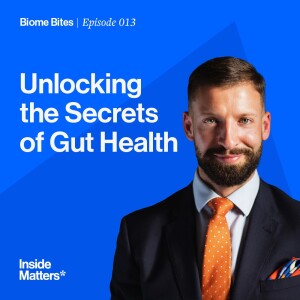
Thursday Jul 25, 2024
Thursday Jul 25, 2024
In this episode of Biome Bites, we go back to basics to cover the overall importance of gut health while addressing some common misconceptions and myths.
00:00:00 Intro
00:00:44 Importance of gut microbiome
00:02:22 Misinformation addressed
00:04:21 Gut health is more than the stomach
00:08:12 Different bacteria in the gut
00:10:31 Functions of the gut
00:13:08 Microbial metabolism
00:14:04 Traditional wisdom
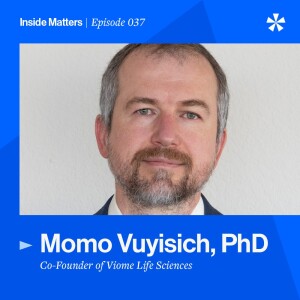
Thursday Jul 11, 2024
Thursday Jul 11, 2024
The following is a conversation with Dr. Momo Vuyisich, co-founder and chief scientific officer at Viome. Viome is a life sciences company that analyses the activities in your oral microbiome, gut microbiome, and blood using RNA, essentially measuring gene expression.
This gives the company the ability to be able to assess what the microbiome in these various areas of the body is doing and gives insights into potentially how that links to diseases, which gives you personalised recommendations for how to improve your microbiomes through your environment. So basically your diet.
Their vision is that in the future, through the analysis of all of this data, they're able to make predictive bets on who is at higher risk of developing particular diseases and issues due to the composition and function of the microbiome.
Momo is an amazing communicator. You'll learn about. the microbiome and its importance in gut health. You'll hear about his own story in terms of how he managed to cure chronic disease through his own diet. You'll hear about his vision for Viome, how the pharma industry works in his opinion, and how things are going to improve over the coming decades.
Fascinating discussion, I enjoyed it. I wanted to thank Momo for coming on as such a busy person. Now, with the introduction done, I wanted to say thank you to all of our listeners for supporting the podcast. Some of you are listening to every single episode and sending feedback about the episode, what you liked, what you didn't like, and what you learned.
We've been going now for a year and a half. And we're loving every single moment and the feedback from listeners makes it all worthwhile. So if you're enjoying it and you haven't yet liked and subscribed, please hover your finger over that button and give us a five-star review.
00:00:00 Intro
00:05:27 Momo’s vision
00:08:08 Is science improving human health?
00:15:58 Applying science to big health problems
00:18:11 Human genome
00:27:46 Vaccines with probiotics?
00:36:27 Is the microbiome undervalued?
00:45:59 Next gen RNA sequencing
00:52:37 Building Viome
00:58:34 Preventing all disease through diet
01:00:41 Sialic acids
01:11:16 Food industry
01:14:24 Importance of sleep
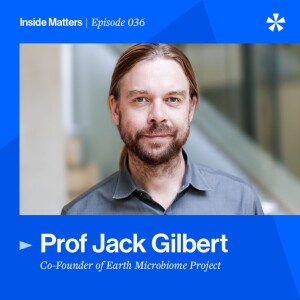
Thursday Jun 20, 2024
Thursday Jun 20, 2024
The following is a conversation with Professor Jack Gilbert, a professor at the University of California, San Diego, along with his many other very interesting titles and job roles. This includes the co-founder of the Earth Microbiome Project, the American Gut Project, and also featured in the very popular recent Netflix documentary, Hack Your Health.
He is a master of the microbiome. We covered all aspects of the microbiome, the ocean, the soil, how it could impact climate change, and gut health, responses to drugs.
Takeaways
The microbiome has a significant impact on various aspects of our health, including gut health, responses to drugs, and even climate change.
A diverse and healthy diet, with a focus on consuming a variety of plants, is crucial for promoting a beneficial microbiome.
Understanding the dynamic nature of the microbiome and its mechanisms is essential for developing effective therapies.
Changing behaviours and promoting adherence to therapies and dietary recommendations can be challenging, but finding solutions that align with our culture can help overcome these barriers. Probiotics and the microbiome have the potential to improve human health and address environmental challenges.
Quantifying the microbiome is crucial for understanding its role in health and disease.
Urgent action is needed to address climate change, and microbiology can play a role in improving soil health and mitigating its effects.
The gut-brain axis is an important area of research, and microbiome-based therapies show promise for mental health.
00:00 Introduction to Professor Jack Gilbert and his work
02:20 The impact of the microbiome on climate change
04:16 The role of diet in promoting a beneficial microbiome
07:03 Precision ecology: Understanding the dynamic nature of the microbiome
09:23 Challenges and solutions in promoting behaviour change for microbiome health
17:52 The importance of time in studying the microbiome
30:08 Parallels and commonalities between different microbiomes
39:19 The future of microbiome research and therapies
44:59 Probiotic Building Materials
48:33 Revolutionizing Microbiome Sample Collection
56:55 Microbiome-Based Therapies for IVF Success
01:09:29 Addressing Climate Change through Microbiology
01:19:21 Urgent Action and Application of Microbial Therapies
01:23:01 The Gut-Brain Axis and Mental Health






